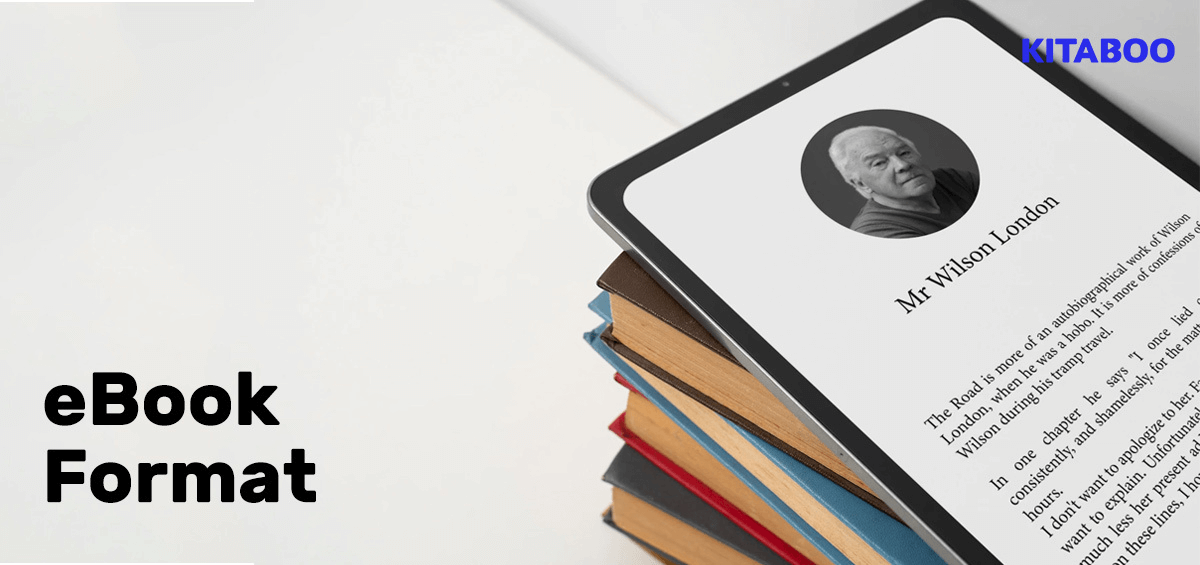More and more people are becoming tech-savvy with each passing day. As per research, 5.18 billion people globally use the internet. With the rising number of internet users, the preference for digital reading is rapidly increasing.
As a result, eBooks, with their interactive elements, easily upgradable versions, and pleasing aesthetics, have started gaining popularity in the past few years. In today’s digital era, it is predicted that the number of eBook readers will reach 1.1 billion by 2027.
Considering this scenario, being aware of the many existing eBook formats and top-level eBook publishing platforms like KITABOO is crucial if you plan to publish eBooks.
In this blog, we will delve into the different types of eBook formats and the factors to consider when choosing eBook formats for your business publications.
Table of Contents:
- Types of eBook Formats
Types of eBook Formats
From ePub to PDF to RTF, a wide range of eBook formats are available for converting your eBooks. Let’s explore each of the formats one by one.
1. ePub
Discovered by the International Digital Publishing Forum in 2007, ePub has since replaced the Open eBook format and gone on to become one of the most widely used eBook formats globally.
ePub, also called electronic publication, follows an open standard and supports vendor independence. It also supports add-on features such as hyperlinks, graphics, audio, video, and other interactive elements.
Capable of displaying reflowable as well as fixed layout content on many devices, ePub comes with DRM protection and other important eBook protection features.
2. PDF
One of the most commonly accepted eBook formats today is the portable document format (PDF). Developed by Adobe, PDF strives to deliver a well-designed and easy-to-navigate reading experience.
Since it maintains a fixed format, a PDF can be hard to adjust and read on a small screen. Incapable of displaying reflowable content, it supports limited interactive elements.
Despite this, PDFs do hold to an open standard format, are compatible with reading platforms, and support fundamental eBook protection features.
3. MOBI, AZW, and AZW3
MOBI, also known as Mobipocket, is the eBook file format used by Amazon for Kindle eBooks. While similar to an ePub, it is not an open standard format and does not support video and audio files.
To overcome the limitations of MOBI, Amazon came up with two proprietary formats: AZW in 2007 and its advanced version called AZW3 in 2011.
Both these eBook formats support video and audio files. However, AZW3 supports more fonts, styles, and content layouts than AWZ.
4. DOCX
The proprietary format of Microsoft Word, DOCX, grew out of its old format called DOC.
DOCX can easily be converted into different eBook formats. It supports reflowing of the eBook content and allows for editing of the same.
Though it is an open standard eBook format, it supports only a finite number of interactive features, including video files, charts, tables, colorful images, annotations, and audio files. It does not support DRM protection or other eBook protection measures.
5. FB2
Originating in Russia, FB2 or FictionBook format is an XML-based eBook format. It describes the structure and semantics used in the eBook document. It also specifies the metadata, including the title of the eBook and the name of the publisher and author.
In addition, it is useful for indexing and automatic processing. Besides being good for storing information, FB2 formatted eBooks can be easily converted into different eBook formats, making them a favorable format in the eyes of authors, publishers, and readers.
6. IBA
The proprietary format of Apple, Inc., IBA is used exclusively for books made in the iBook Author app. With a striking resemblance to the EPUB format, IBA supports interactive elements like videos, images, audio, and more. It also supports strong DRM protection measures.
However, since it operates on the basis of the customized widget codes present in the Apple Books app, it cannot function in other eBook reader apps and formats. As a result, the audience for IBA-formatted eBooks doesn’t extend beyond Apple users.
7. RTF
Developed by Microsoft Corporation, rich text format or RTF is used for Word documents. RTF allows for easy editing of the document, reflowing and formatting of the text, and the retention of special characters.
Further, it supports multimedia elements, DRM protection measures, and the conversion of already formatted eBooks into other eBook formats. All these features and multi-device compatibility have made RTF one of the most popular eBook formats globally.
8. HTML5
Since its inception in 2008, HTML5 has become famous worldwide. A very mobile-friendly format, HTML5 supports cross-platform compatibility. It further supports the presentation of content embedded with hyperlinks, videos, audio, and graphical elements.
HTML5 includes the functioning features of the past versions and provides more support and styles for language, designing, and editing eBook content. Capable of functioning across e-readers, tablets, smartphones, and many other devices, the HTML5 format enjoys a global audience.
Factors to Consider before Choosing an eBook Format
Choosing the wrong eBook format can have disastrous results. It can adversely affect the reading experience and support compatibility with unwanted devices.
So, before you decide on an eBook format, there are several factors you should consider first to avoid any sort of trouble. The three main factors include:
- Deciding the target audience for your business publication
- Choosing the platforms you are going to distribute your eBook on
- Make a note of the digital assets (text, images, audio, video, etc.) present in your document
Once you have the answer to these factors, you can decide on the eBook format that meets your requirements and go ahead with publishing your eBook.
Also Read: Best eBook Creation Softwares
The End Note
Now that you know about the different types of eBook formats and the essential factors to consider, you should also know that the eBook market is expected to grow to a value of $15.33 billion by 2027.
If you want to capitalize on this without wasting much time, money, or any other resources, outsourcing eBook formatting services from KITABOO is an excellent idea.
KITABOO is an easy-to-use publishing platform. You can create eBooks, convert them into different eBook formats, and distribute DRM-protected eBooks. As a firm believer in delivering highly secure eBook experiences, KITABOO is trusted by 15 million users from 30 countries across the globe.
To learn more about eBook formatting services, get in touch with KITABOO.
You can get started by contacting our expert team for advice.
To know more, please write to us at KITABOO@hurix.com.
Suggested Reads:
Discover How An Ebook Conversion, Publishing & Distribution Platform Can Help You
Kitaboo is a cloud-based content platform to create-publish & securely distribute interactive mobile-ready ebooks.
You May Also Like









